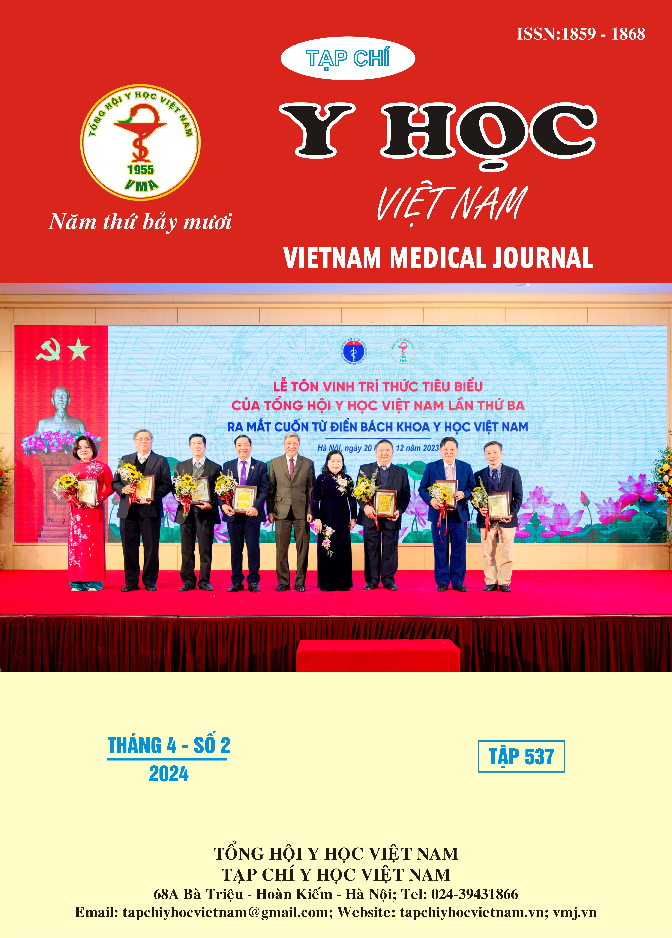CAREGIVER BURDEN IN AKINETIC-RIGID PARKINSON’S DISEASE PATIENTS AT STAGES III, IV, V
Main Article Content
Abstract
Purpose: Assess the burden and some factors related to the burden of taking care of akinetic-rigid Parkinson’s disease patients at stages III, IV, V. Subjects and research methods: Cross-sectional descriptive study on 51 patients with AR subtype of Parkinson’s disease at stages III, IV, V in the National Geriatric Hospital from September 2022 to October 2021, with along with their primary caregivers. The patients were diagnosed with Parkinson’s disease according to the criteria of the UK Parkinson’s Disease Society Brain Bank (UKPDSBB), Akinetic-rigid (AR) subtype according to the Parkinson’s Disease Assessment Scale (UPDRS), stages III, IV, V according to Hoehn & Yahr scale, assess the caregiver burden by the Zarit burden index (ZBI). Results: Conclusion: The result of the study have shown that the care of AR Parkinson’s at stages III, IV, V creates a huge burden for primary caregivers in their physical and mental health, so it’s necessary for comprehensive care and attention from the family and society.
Article Details
Keywords
Parkinson’s disease; akinetic-rigid subtype; stage III, IV, V; burden of care.
References
2. Nguyễn Thị Thanh Bình. Gánh nặng chăm sóc bệnh nhân Parkinson giai đoạn cuối. Đại học Y Hà Nội. Published online 2019.
3. Martinez-Martin P., Forjaz M.J, Frades-Payo B và cộng sự, “Caregiver Burden in Parkinson’s Disease,” Movement Disorders, vol. 22, no. 7, pp. 924-931, 2007.
4. Jones AJ, Kuijer RG, Livingston L, et al. Caregiver burden is increased in Parkinson’s disease with mild cognitive impairment (PD-MCI). Transl Neurodegener. 2017;6(1):17. doi:10.1186/ s40035-017-0085-5
5. Carod-Artal F.J., Mesquita H.M., Ziomkowski S. và cộng sự, “Burden and health-related quality of life among caregivers of Brazilian Parkinson’s disease patients,” Parkinsonism and Related Disorder, vol. 19, pp. 943-948, 2013.
6. Tessitore A, Marano P, Modugno N, et al. Caregiver burden and its related factors in advanced Parkinson’s disease: data from the PREDICT study. J Neurol. 2018;265(5):1124-1137. doi:10.1007/s00415-018-8816-9
7. Mosley P. E., Moodie R., Dissanayaka N, “Caregiver Burden in Parkinson Disease: A Critical Review of Recent Literature,” Journal of Geriatric Psychiatry and Neurology, vol. 30, no. 5, pp. 235-252, 2017.
8. Lee GB, Woo H, Lee SY, Cheon SM, Kim JW. The burden of care and the understanding of disease in Parkinson’s disease. Arias-Carrion O, ed. PLoS ONE. 2019;14(5):e0217581. doi:10. 1371/journal.pone.0217581
9. Tan M., Lim E.C., Nadkami N., “The Characteristics of Patients Associated With High Caregiver Burden in Parkinson’s Disease in Singapore,” Front Neurol, vol. 10:561, 2019.
10. Zhong M, Peppard R, Velakoulis D, Evans AH. The relationship between specific cognitive defects and burden of care in Parkinson’s disease. Int Psychogeriatr. 2016;28(2):275-281. doi:10. 1017/S1041610215001593


